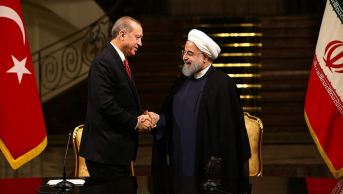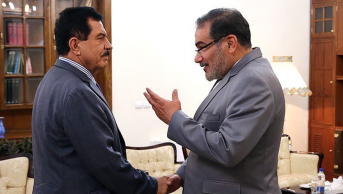Iran-Russia Relations and Putin’s Visit to Tehran

Rapprochement between Iran and Russia that has been recorded in the last couple of years is one of the most outstanding aspects of Iranian foreign policy. Leaving aside the debates on whether the nature of that rapprochement is strategic or tactical, the relations between Moscow and Tehran has been furthered since the Nuclear Deal of July 2015. Russian President Vladimir Putin’s visit to Tehran on November 23, 2015 is a new turning point for Iran-Russia relations.
Gas Exporting Countries Forum (GECF)
There were two reasons behind Putin’s trip to Tehran. First, he attended the Third Summit Meetings of Gas Exporting Countries Forum (GECF). GECF is originated in 2001 by the Iranian initiatives that aimed at furthering cooperation between the gas exporting countries. Headquartered in Doha, the GECF currently has 12 members and 6 observers. This forum that brings major natural gas producers together holds the control of virtually 70 percent of actual gas reserves in the world. Unlike OPEC that brought major oil exporting countries together, the GECF do not play an effective role in natural gas markets since it lacks price-control mechanisms such as the quota system. The member countries only exchange their views and projections on production techniques, estimations for outputs, investments and market conditions.
The Summit of GECF first met at Doha in 2011, and then in Moscow in 2013. The participation of seven heads of state to the Tehran Summit is viewed as a source of prestige for the Iranian government that strives for integration into the international system and global economy. While addressing the forum, Iranian President Hassan Rouhani reminded the adverse affects of the American sanctions on the energy sector in Iran and stated that those conditions would change with the implementation of the Nuclear Deal. Rouhani stated that his country is seeking international partners in order to develop oil and gas reserves.
Iran-Russia Relations After the Nuclear Deal
The second aim of Putin in visiting Tehran was to improve Iran-Russia relations. The Nuclear Deal has decreased Iran’s political and economic dependency to Russia. Moreover, because of the growing Russian engagements in the Middle East, Iran has become more valuable for Russia. On the other side, mistrust among the Iranian leaders towards the West and the critical importance of the Russian support on a number of regional issues forced Iran to maintain good relations with Russia. Consequently, political and economic relations between the two countries have gained a great momentum after the Nuclear Deal. Above else, the economic cooperation between Iran and Russia that was built to overwhelm sanctions was furthered in the post-deal period. Russian and Iranian officials vow to increase the volume of bilateral economic transactions from its current level of $ 2 billion to $ 4 billion in a short time.
The two governments agreed to provide a loan worth of $ 7-8 billion in order to support investments of Russian companies in Iran. They also agreed to form an investment bank to raise funds for joint investment projects. Just prior to his departure from Moscow to Tehran, Putin revoked the ban on supplying Iran with uranium enrichment equipment. Likewise, the two countries agreed to deliver S-300 missile systems to Iran, which had turned into a messy problem since 2007. Thus, one of the most important disagreements between Iran and Russia is eliminated.
Iran and Russia resolved to increase bilateral relations on the regional level as well. Iran seeks membership for the Eurasian Economic Union that has been led by Russia, and for the Shanghai Cooperation Organization. The two countries are cooperating on a number of projects that would connect Iran to Russia and to the Central Asia through rail networks – the North-South corridor.
Regional cooperation between the two countries is well illustrated at the Syria issue. They have been coordinating their policies towards Syria for a long time. Iran publicly endorsed Russian military operations in Syria that started at the end of last September. Iraq, Iran, Russia and Syria formed an information center in Baghdad in order to “coordinate the struggle against terrorism.” In return, Russia insisted on the Iranian involvement in diplomatic attempts to solve the Syria crisis. Eventually, Iran joined the Vienna talks on Syria.
Putin’s Visit to Tehran
In Putin’s visit to Tehran, the two countries signed seven cooperation agreements and memoranda of understanding. Accordingly, the parties agreed on the construction of a thermal power station in Iran and a desalinization plant in Bandar Abbas by the Russian engineering firm Technopromexport, electrification of railway line between Garmsar and Inceburun, facilitation of travels of Iranian and Russian citizens, and cooperation on the health sector.
Besides the bilateral agreements, “cooperation against terrorism and the Syria issue” was the most important agenda of the visit. Rouhani and Putin declared that Iran and Russia would continue their cooperation against terrorism and their search for political solution to the Syria crisis.
The most interesting aspect of Putin’s visit to Tehran was his meeting with the Supreme Leader of the Revolution, Ayatollah Ali Khamenei. Putin presented a manuscript of Holy Quran as a gift to Khamenei. Calling Iran as a “trustworthy ally in the region”, Putin stated that Russia would always be committed to solidarity with its allies. Khamenei stated that the United States is aspiring to dominate the whole West Asia in the long term, which is harmful for the nations and peoples in this region, particularly Iran and Russia. He asked for greater interactions between the two countries in order to overcome that threat.
The most dramatic implication of the Nuclear Deal on the Iranian foreign policy is the rapprochement between Iran and the West. Many European delegations of businessmen and politicians have already visited Tehran. Moreover, the Western countries have started to view Iran as a potential partner in the solution of Syria and Yemen crises in the Middle East, and in the struggle against the ISIS. Additionally, the removal of sanctions will decrease Iranian political and economic dependency on Russia. However, the growing convergence of interests and concerns between Moscow and Tehran leads to the deepening of Iran-Russia relations. The recent visit of Putin to Tehran indicates that the close relations between Iran and Russia will be continuing on a more powerful ground.









